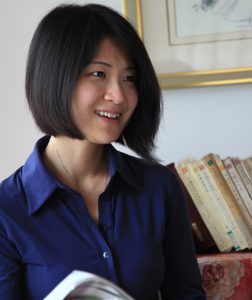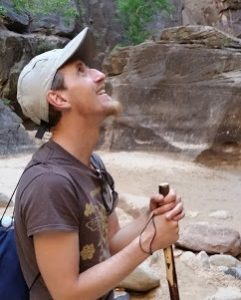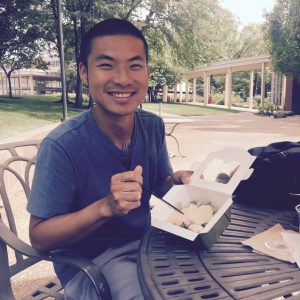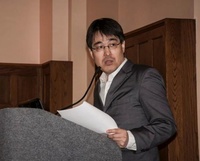Home » 2016
Yearly Archives: 2016
Virtue, Politics and Culture (1) “The Hope for Our Leader’s Virtue – Just a Historical Hangover?” Frank Saunders Jr. (University of Hong Kong)

Frank Saunders Jr is a PhD candidate in the philosophy department at the University of Hong Kong.
Do the Moral Characters of our Leaders Really Matter?
The rulers of the ancient Chinese warring states had absolute authority over their subjects, and were therefore principally responsible for their well-being. The Confucian and Mohist political thinkers of the Warring States period developed the idea that a ruler can lead his people to order and prosperity only if he cultivates his virtue or moral character (de 德). (more…)
Neglected Virtue (11) Wuwei – “There’s Something in Doing Nothing ” Jordan Jackson (A Teacher in Wuhan, China)
Jordan Jackson received his BA and MA in Philosophy from the University of Cincinnati, and a second MA in Chinese Philosophy from Huazhong University of Science and Technology in Wuhan. He is currently working as a teacher in Wuhan while he prepares to pursue a PhD in China.
Wuwei and Radical Action
Traveling home for Christmas holiday, on a flight from Shanghai to Detroit, I had the chance to watch The End of the Tour (James Ponsoldt, 2014), a film centered around David Foster Wallace (played by Jason Segel) and a Rolling Stones journalist (Jesse Eisenberg) on the last leg of the Infinite Jest book tour. As the characters board a flight headed for Minneapolis, the character Wallace said something that struck a nerve in me. While discussing his solutions for reversing a low point in his life, Wallace describes his various strategies as, “a very American I-will-fix-this-somehow-by-taking-radical-action sort of thing.” (more…)
Neglected Virtue (10) Cross-Cultural Empathy – “Ethics Under the Mask of Aesthetics?” Xuenan Cao (Duke University)
Xuenan Cao is a 3rd year Ph.D student in the Literature Program at Duke University.
Empathy and Well-Being
To concern oneself with the well-being of others, as in cases of altruism and charity, is one act. To empathize with imaginary characters or characters from a different culture is a rather similar act, since this act also participates in framing how one perceives the well-being of others. In such an act, what appears to be an aesthetic issue can be, in fact, an ethical one. (more…)
[CCP & GAI Joint Workshop] Aristotle on the Connection Between Virtue and Happiness
The Center for Comparative Philosophy & Global Asia Initiative Joint Reading Workshop
Aristotle on the Connection Between Virtue and Happiness
Time: 12:00 – 14:00 Thursday Nov 10th
Location: West Duke 204
Sukaina Hirji (Princeton PhD) is Assistant Professor in the Philosophy Department at Virginia Tech. Her area of research specialty is ancient philosophy, with a particular focus on Aristotle.
Commentator: Sungwoo Um (Ph.D. Student, the Department of Philosophy, Duke University)
Neglected Virtue (9) Nunchi (눈치) – “A Quick Grasp of Micro-ethical Situations” Seth Robertson (University of Oklahoma)
Seth Robertson is a PhD student in Philosophy at the University of Oklahoma focusing on moral psychology.
Nunchi
Nunchi (눈치, pronounced “noon-tchee”), a Korean word meaning literally “eye-measure,” isn’t widely considered a virtue, but it should be. Nunchi is the ability both to accurately read others’ mental states by the subtlest of cues and to use this information to expertly steer social situations. The person who notices the tiniest twinge of discomfort on a colleague’s face when a new topic is broached, and then deftly steers the conversation away from that topic has lots of nunchi; the person who always puts his foot in his mouth lacks it. Nunchi is both perceptive and performative. It is not quite social or emotional intelligence and not quite tact, but it includes them. (more…)
Neglected Virtue (8) Mudita (or Sympathetic Joy) – “The Art of Sharing Well-being” Ewan Kingston (Duke University)
Ewan Kingston is a PhD student at the Department of Philosophy, Duke University.
Sympathetic joy
In a traditional Indian teaching preserved in Buddhism, the path to a fulfilling life consists of practicing four virtues – kindness, compassion, equanimity and… mudita. The last lacks an obvious English translation, a hint that perhaps Western culture could use more reflection on it.
Mudita is probably most easily explained by considering those that stand in opposition to it: sour grapes, envy and schadenfreude. We know what it is to disparage someone else’s good fortune, or to desire it for ourselves, and even to rejoice in in an enemy’s suffering. To embody mudita, in contrast, is to rejoice in another’s happiness, to feel genuine joy at their joy. Thus, a common translation of mudita is “sympathetic joy”. (more…)
Neglected Virtue (7) The Virtue of Youthful Adulthood – “Smells Like Teen Spirit” Chong Yuan (St. Louis University)
Chong Yuan is a Graduate Student in Philosophy at St. Louis University. He describes himself as a “perplexed feminist learning to run”.
Now that you are reading this blog, I assume that you care about virtue, culture, and the interaction between them. If that is the case, I urge you to watch Danqing Chen’s mini TV series “Ju Bu” (Of Parts). It was first aired on Youku.com in 2015, and in each episode Chen presented some artwork (mostly paintings) or artist in the light of his own philosophy of art. The program as a whole is a marvelous display of the virtues of the artworks as well as of the artists, and it is all the more fascinating as Chen drew examples all the time from the histories of both Western and Chinese art.
[CCP & GAI Joint Workshop] Nishida on Well-Being: Reflections from Medieval Buddhist Philosophy
The Center for Comparative Philosophy & Global Asia Initiative Joint Reading Workshop
Nishida on Well-Being: Reflections from Medieval Buddhist Philosophy
Time: 12:00 – 14:00 Thursday Oct 13th
Location: West Duke 204
** The Center for Comparative Philosophy will provide a light lunch for the workshop. The room will open from 12:00 for people to serve themselves and take a seat.
Neglected Virtue (6) Mana (or Authority) – “Restoring the Māori Virtue” Piripi Whaanga (Writer, Musician)
Piripi Whaanga has a MA in Philosophy developing a practical New Zealand tikanga that connects kiwis. He is a published author and contributor of articles to e-magazines, and journals as well as producing radio programmes. An accomplished songwriter and performer.
Balancing the needs of the many with personal responsibility is a concept that needs re-emphasizing in contemporary New Zealand culture. It’s probably true around the world but a native Māori virtue called mana, gives New Zealanders a unique chance to rediscover this cultural well-being at a time when countries are being asked to take in refugees. (more…)
Neglected Virtue (5) Altruistic Humbleness – “Why not just say “I want it”?” Yuan Yuan (Yale University)
My 4-year-old daughter is sweet and extremely shy. Like kids in her age, she loves snacks, toys and hot spots on the playground. When it is time to allocate those resources (say, a pretty new hand-drum this time) at schools, the typical scene would look like the follow: while her classmates raise their hands as high as possible shouting out “Me!” “Me!” “Me!”, she would be sitting there silently…At first her teachers try hard to keep a queue, and give everyone a fair chance to access the drum, my daughter waits and waits at a corner in silence, until everyone has played with the drum, gotten bored with it, and left it unattended. And just at the moment when the teachers start to think: “enough for all the kids,” she quietly walks up to the drum, carefully picks it up, and smiles…








